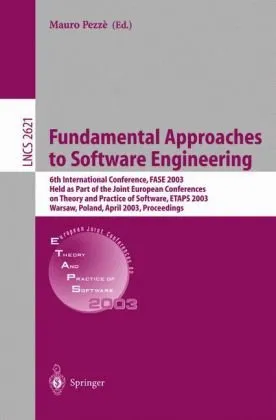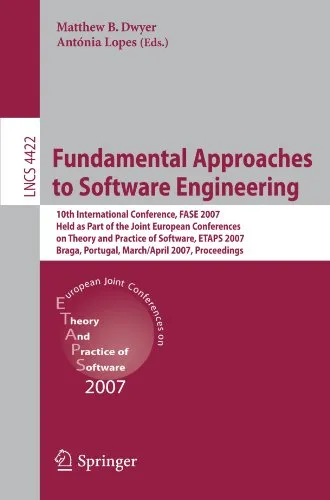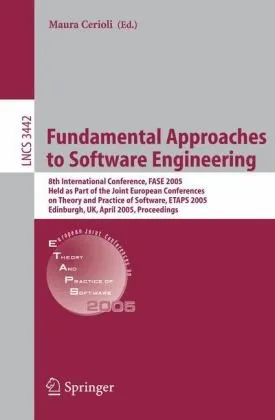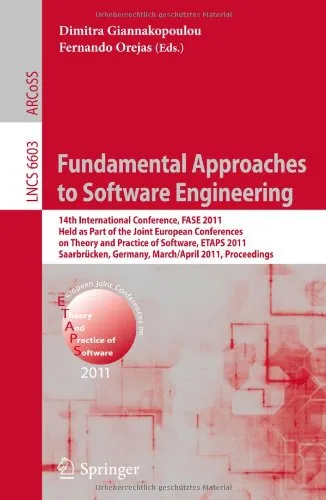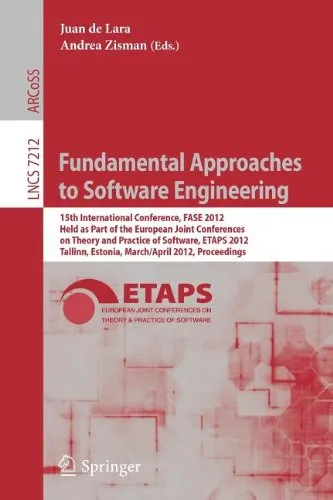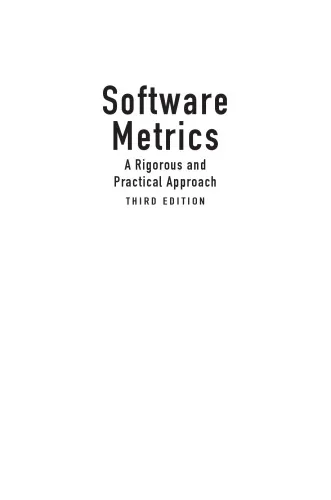Fundamentals of Software Engineering: 6th International Conference, FSEN 2015, Tehran, Iran, April 22-24, 2015. Revised Selected Papers
4.0
بر اساس نظر کاربران

شما میتونید سوالاتتون در باره کتاب رو از هوش مصنوعیش بعد از ورود بپرسید
هر دانلود یا پرسش از هوش مصنوعی 2 امتیاز لازم دارد، برای بدست آوردن امتیاز رایگان، به صفحه ی راهنمای امتیازات سر بزنید و یک سری کار ارزشمند انجام بدینکتاب های مرتبط:
معرفی کتاب
کتاب Fundamentals of Software Engineering: 6th International Conference, FSEN 2015 مجموعه مقالاتی است که در ششمین کنفرانس بینالمللی مهندسی نرمافزار (FSEN 2015) در تهران، ایران ارائه شدهاند. این کنفرانس که در تاریخ 22 تا 24 آوریل 2015 برگزار شد، محلی برای پژوهشگران، متخصصان، و فعالان صنعت برای بحث و تبادل نظر در زمینه جدیدترین دستاوردهای مهندسی نرمافزار بود. این کتاب مقالاتی را که پس از داوری دقیق انتخاب شده و به صورت اصلاحشده منتشر شدهاند، به مخاطبان ارائه میدهد.
خلاصهای از کتاب
این کتاب به مباحثی مهم و چالشبرانگیز در حوزه مهندسی نرمافزار میپردازد و شامل موضوعاتی مانند Formal Methods، Language-based Approaches، Verification and Validation، Distributed Systems، و Model-Driven Development است. مقالات ارائهشده در این مجموعه به راهحلهای دقیق و نوآورانه برای مشکلاتی که مهندسان نرمافزار و پژوهشگران با آن مواجه هستند، پرداختهاند. همچنین مباحثی همچون پیشرفتهای اخیر در روشهای Formal و کاربرد آنها در طراحی سیستمهای توزیعشده و پیچیده به طور ویژه برجسته شدهاند.
یکی از نقاط قوت این کتاب، تمرکز روی ادغام مفاهیم نظری و کاربردهای عملی است. این ترکیب باعث میشود کتاب مورد توجه پژوهشگران دانشگاهی و مهندسان حرفهای صنعت قرار گیرد. علاوه بر این، این کتاب ابزارهایی را برای تحلیل و طراحی سیستمهای پیچیده ارائه میکند.
نکات کلیدی و دستاوردها
- ارائه جدیدترین تکنیکها و روشها در حوزه Formal Methods.
- مباحث عمقی مرتبط با Verification and Validation.
- تمرکز خاص روی سیستمهای توزیعشده (Distributed Systems) و چالشهای برنامهنویسی آنها.
- تجزیه و تحلیل کاربرد روشهای Language-based در مسائل مهندسی نرمافزار.
- ارائه مطالعات موردی و گزارشهای تجربی برای ارتباط بهتر نظریه و عمل.
نقلقولهای معروف از کتاب
"The gap between theoretical foundations and industrial applications is bridged, bringing software engineering closer to real-world challenges."
"Formal languages and verification techniques play a pivotal role in ensuring the reliability of distributed systems."
چرا این کتاب مهم است؟
این کتاب برای هر کسی که در زمینه مهندسی نرمافزار فعالیت میکند، اهمیت زیادی دارد. تمرکز اصلی آن بر روی روشهای Formal و کاربرد آنها در سیستمهای پیچیده باعث شده است که به منبعی ارزشمند برای پژوهشگران و مهندسین تبدیل شود. ترکیب مفاهیم تئوری و کاربردی، همراه با مطالعات موردی واقعی، این کتاب را به یک مرجع جامع برای یادگیری و توسعه در این حوزه بدل کرده است.
علاوه بر این، همکاری نویسندگان برجسته از سراسر جهان تضمین میکند که این کتاب چشماندازی بینظیر از روندهای فعلی و آینده مهندسی نرمافزار ارائه میدهد. با توجه به افزایش پیچیدگی پروژههای نرمافزاری و نیاز به تکنیکهای نوین تحلیل و توسعه، این کتاب ابزاری حیاتی برای متخصصان این حوزه است.
Introduction
The book "Fundamentals of Software Engineering: 6th International Conference, FSEN 2015, Tehran, Iran, April 22-24, 2015. Revised Selected Papers", is an authoritative compilation of revised and peer-reviewed papers presented at the 6th iteration of the FSEN conference. Esteemed researchers, practitioners, and academics gathered to discuss pioneering advances in the field of software engineering, spanning both theoretical and practical dimensions. This conference brought together ideas that robustly shape the future of a discipline integral to every facet of technological innovation.
This volume emphasizes emerging research topics in software engineering, underlining its multidisciplinary nature. Engaging with everything from formal frameworks and methodologies to practical, executable software development, the book creates a bridge between theory and application for computer scientists, software engineers, and scholars. Edited by Mehdi Dastani and Marjan Sirjani, it consolidates diverse perspectives, offering significant insights for both academia and industry. In a rapidly evolving field, this book stands as a testament to deep thought, intellectual rigor, and the collaborative spirit of innovation.
Detailed Summary of the Book
The book captures the essence of the FSEN 2015 conference by bringing together 20 revised papers, meticulously selected through a rigorous reviewing process. These papers tackle issues of practical relevance while fostering innovation in core areas, such as formal verification methods, distributed systems’ modeling, software development paradigms, and advanced dynamic testing.
The first section delves into formal methods and verification, presenting innovative approaches to model-check complex systems and their correctness. A significant part of the theoretical contributions focuses on improving dependability and predictability in software systems — a foundation for engineering safety-critical systems. The book also traverses contemporary methods for concurrent and distributed systems, discussing methods to handle scalability, component interaction, and fault tolerance.
Another key highlight is the exploration of programming paradigms and model-driven approaches, driving consistency across software development life cycles. Dynamic software testing, practical performance assessments, and improvements in agile development methodologies also find their place in this expertly curated edition. Engaging with cross-disciplinary topics like human-in-the-loop models and real-time behaviors, the research shows its applicability across domains, including finance, medicine, and autonomous systems.
The papers not only illuminate problem spaces but also propose pragmatic solutions that balance efficacy with computational complexity. The book serves as a navigation tool in a sea of innovation, helping researchers, advanced students, and professionals alike to contextualize the multitude of challenges and opportunities in modern software engineering.
Key Takeaways
- Comprehensive insights into formal methods for system design and model verification.
- A practical guide towards managing concurrency in distributed systems, including scalability and security challenges.
- Advances in performance testing and verification for real-time and autonomous systems.
- Emerging trends in model-driven development and human-in-the-loop software engineering paradigms.
- A cross-disciplinary approach to research, integrating theoretical and application-oriented perspectives in software engineering.
- Empirical findings and case studies that extend the relevance of modern research into industrial settings.
- Better understanding of explicit trade-offs between computational complexity and functional utility in engineering systems.
Famous Quotes from the Book
"Formal methods are not just tools; they are the bridge between abstract system design and its reliable implementation in the real world."
"The challenges of distributed systems are not confined to scalability but extend to trust, reliability, and fault tolerance in an increasingly connected world."
"The success of any software engineering effort lies in its adaptability — the capacity to evolve dynamically with the demands of its environment and users."
Why This Book Matters
At its core, this book addresses one of the most pressing questions in software engineering today: how can we design, develop, and deploy systems that are both robust and adaptive in an era defined by complexity and change? By compiling world-class research, this volume serves as a guiding compass for practitioners and academics charting new territories in formal methods, distributed systems, and dynamic testing.
Software engineering is no longer a standalone discipline confined to computing; it underpins virtually every industry – from healthcare and transportation to defense and finance. The insights and research shared in this book have the capacity to impact global industry standards significantly. Moreover, with its emphasis on cross-disciplinary methods and innovation, the book strengthens bridges between academic theories and industrial realities, closing the gap for impactful technological adoption.
In an age where software systems are increasingly interconnected and mission-critical, this book is an invaluable asset for anyone looking to contribute meaningfully to the field of software engineering. Its relevance extends beyond the FSEN conference, offering timeless lessons for those who believe in the transformative power of software in shaping the future.
دانلود رایگان مستقیم
شما میتونید سوالاتتون در باره کتاب رو از هوش مصنوعیش بعد از ورود بپرسید
دسترسی به کتابها از طریق پلتفرمهای قانونی و کتابخانههای عمومی نه تنها از حقوق نویسندگان و ناشران حمایت میکند، بلکه به پایداری فرهنگ کتابخوانی نیز کمک میرساند. پیش از دانلود، لحظهای به بررسی این گزینهها فکر کنید.
این کتاب رو در پلتفرم های دیگه ببینید
WorldCat به شما کمک میکنه تا کتاب ها رو در کتابخانه های سراسر دنیا پیدا کنید
امتیازها، نظرات تخصصی و صحبت ها درباره کتاب را در Goodreads ببینید
کتابهای کمیاب یا دست دوم را در AbeBooks پیدا کنید و بخرید
1336
بازدید4.0
امتیاز0
نظر98%
رضایتنظرات:
4.0
بر اساس 0 نظر کاربران
Questions & Answers
Ask questions about this book or help others by answering
No questions yet. Be the first to ask!
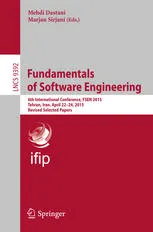

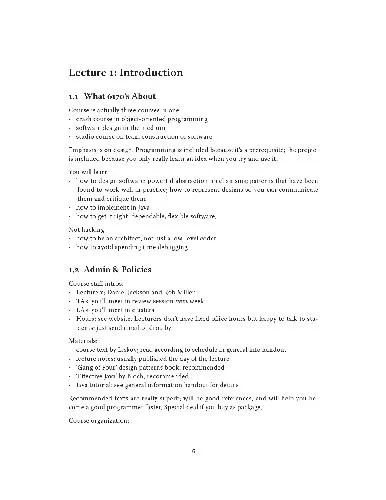
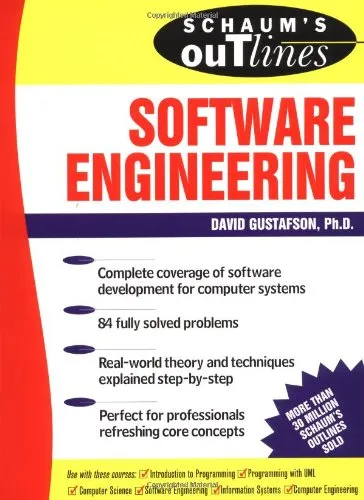
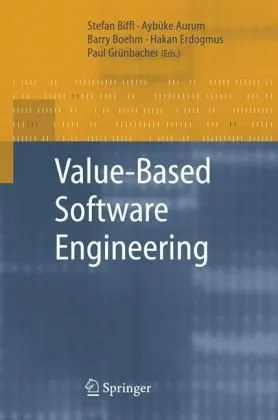
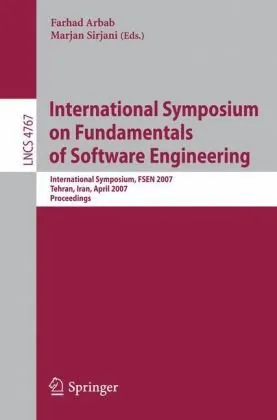
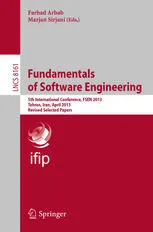
![Fundamentals Of Software Engineering, 5Th Ed [Paperback] Mall](https://s3.refhub.ir/images/thumb/Fundamentals_Of_Software_Engineering__5Th_Ed__31573.webp)
